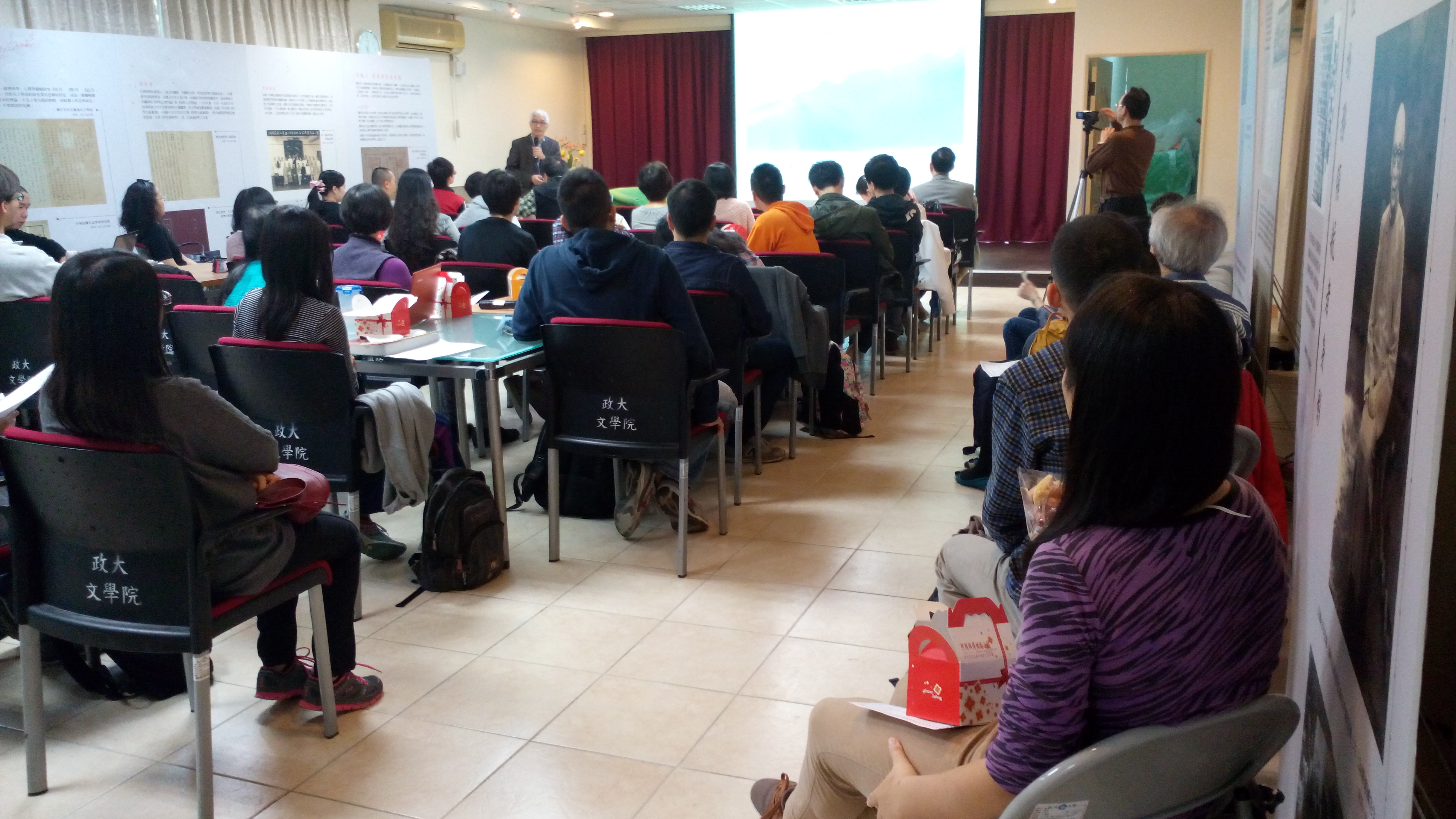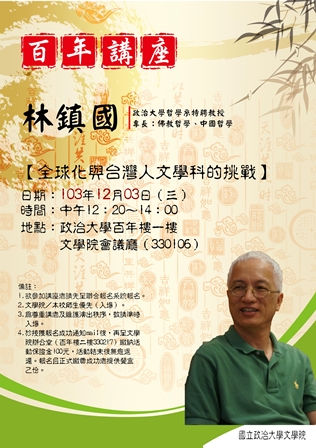政大哲學系漢語哲學新視域論壇-佛教哲學如何看待認識、認識對象與自我意識
Date│103年12月17日(三)14:10-16:30
Venue│政大哲學系圖書室(百年樓222)
日期:103年12月17日(三)14:10-16:30
推動佛學研究國際化經驗談(原題:全球化與台灣人文學科的挑戰)
Date│103年 12 月 3 日(三)中午12:20~14:00
Venue│政治大學 百年樓一樓 文學院會議室(330106)
(103年)文學院院導師活動-百年講座-特聘教授系列
林老師以個人近年主持參與國內外佛學研究計畫的經驗,從國際化競爭的角度,和青年學者談推動國際化的具體做法;並開放討論與大家交流。
地點:政治大學 百年樓一樓 文學院會議室(330106)
曾任哲學系主任;本校資深優良教師;榮獲國科會獎勵特殊優秀人才、傑出研究及甲種研究獎勵;擔任香港中文大學及北京大學等編輯委員。
從“勝軍比量”到“唯識比量”—— 玄奘對簡別語“自許”的使用
Date│2014年11月28日(五)上午 10:30 – 12:30
Venue│政治大學山上校區 百年樓 哲學系330227室
從“勝軍比量”到“唯識比量”—— 玄奘對簡別語“自許”的使用
按照因明作法的通則,對於共比量,除宗體外,其餘宗依、因、喻等都必須共許極成,否則就會犯“不極成”的過失。不過,我們可以通過簡別來避免過失,“若自比量,以許言簡,顯自許之,無他隨一等過。若他比量,汝執等言簡,無違宗等失。……隨其所應,各有標簡。”而一旦作出這樣的簡別,它也就成了自比量或他比量,而不再是共比量。
然而,玄奘在他所作的兩個典範性的因明量式“勝軍比量”與“唯識比量”中,都使用了簡別語“自許”,而奘門後學一般都視其為共比量。那麼,“自許”的簡別是否可以出現在共比量中呢?這與自比量中“自許”的簡別又有何區別呢?
早在上世紀二十年代,呂澂先生在《因明綱要》中就已提出了一個非常重要的看法:“以是因上簡言實有二類,或簡其為宗法,或簡其法自體。諸論但明初門,理准應有後義。”筆者以為,呂先生的這一說法總體是能夠成立的,雖然在某些具體問題上亦有可商榷之處,本文即以“勝軍比量”與“唯識比量”為例來說明這一點。
Jonardon: The self: naturalism, consciousness, and the first-person stance - Reading Group 讀書會
Date│2013/7/17(三)2:00 PM,2013/6/14(五)4:00 PM
Venue│政治大學百年樓哲學系330227室
Ganeri, Jonardon. 2012. The self: naturalism, consciousness, and the first-person stance. Oxford: Oxford University Press. Chapter 7 & 8.
What is it to occupy a first-person stance? Is the first-personal idea one has of oneself in conflict with the idea of oneself as a physical being? How, if there is a conflict, is it to be resolved? The Self recommends a new way to approach those questions, finding inspiration in theories about consciousness and mind in first millennial India. These philosophers do not regard the first-person stance as in conflict with the natural — their idea of nature is not that of scientific naturalism, but rather a liberal naturalism non-exclusive of the normative.
The Self: Naturalism, Consciousness and the First-Person Stance
Date│2013/07/29(一)2:00-5:00 PM,2013/07/30(二)10:00-12:00 AM
Venue│政治大學百年樓哲學系圖書室
The Self: Naturalism, Consciousness and the First-Person Stance
Department of Philosophy, University of Sussex
Venue : Library Room, Department of Philosophy, Chengchi University
2013/07/29(一)2:00-5:00 PM
The Composition of Consciousness and the Theory of Skandhas
2013/07/30(二)10:00-12:00 AM
Self-Consciousness : Reflexive Self-Awareness versus Mental Files
Ganeri, Jonardon. 2012. The self: naturalism, consciousness, and the first-person stance. Oxford: Oxford University Press. Chapter 7 & 8.
Jonardon Ganeri,英國Sussex大學哲學教授,曾在劍橋大學研讀數學與物理學,後於牛津大學獲得哲學博士學位。其研究領域涵括知識論、形上學、語言哲學與邏輯,主要研究自我、意識、自我知識、理性概念等主題,其取徑為連結印度哲學傳統與當代英美分析哲學。本次來台將討論其最新著作 The Self : Naturalism, Consciousness and the First-Person Stance (Oxford University Press, 2012),該書從印度哲學獲得啟發,主張第一人稱立場與某種自然主義是相容的。
The Formation of the Abhidhamma Commentary
Date│2013年11月22日(五)上午10-12時
Venue│政治大學百年樓哲學系圖書室
The Formation of the Abhidhamma Commentary
時間:2013年11月22日(五)上午10-12時
After presenting some background on the Pali commentarial literature and the School of Buddhaghosa, I turn to the Pali Aṭṭhakathā literature in a little more detail and then discuss the authorship of the Abhidhamma commentary. The main part of this paper, however, is concerned with the first part of that commentary, the Aṭṭhasālinī. I examine this work from the point of view of its sources. It can be clearly shown that it is largely taken from the Abhidhamma section of the Mah''-aṭṭhakathā, mostly verbatim — a work dating probably from the late third century A.D. in the form utilized by our author/editor. That work itself, however, was largely a compilation and contains large sections that have been adopted in toto from one or more separate late second century sources as well as earlier commentarial matter from one or more commentaries on the Dhammasaṅgaṇi.
牛津大學退休教授,曾擔任英國佛教研究協會、巴利聖典協會主席,也曾任教於英國曼徹斯特大學多年,是西方學界的阿毗達摩權威,泰國三摩地傳統的禪修指導老師。主要研究領域為巴利文獻與巴利語、佛教史、南傳阿毗達摩、佛教禪修等。
Date│Oct 26, 2014
Venue│政治大學山下校區 研究大樓一樓250102室 哲學基礎研究室 (校門左側)
時間:2013年12月4日(三)2:00-4:10PM
地點:政治大學山下校區 研究大樓一樓250102室 哲學基礎研究室 (校門左側)
講題二:玄奘、清辯、陳那——從“簡別立宗”(*pratijñāviśeṣaṇa)談起
Date│2013年12月3日(二)6:30-8:30PM
Venue│政治大學山上校區 百年樓 哲學系330227室
時間:2013年12月3日(二)6:30-8:30PM
地點:政治大學山上校區 百年樓 哲學系330227室
2014 NCCU-KU-YaleNUS Workshop in Asian Philosophy
Date│March 07-08, 2014
Venue│National Chengchi University, Taipei
09:00-09:10 Welcoming Address
LIN Yuan-tse, Chair, Department of Philosophy, NCCU
Jay Garfield Just Another Word for Nothing Left to Lose: Freedom, Agency and Ethics for Mādhyamikas
DEGUCHI Yasuo The Logic of Provision: Sānlùn Meets Non-classical Logic
LIN Chen-kuo Self-Illumination and Dualistic Illumination: Two Modes of Cognition in Sixth-Century Chinese Buddhist Epistemology
FUJIKAWA Naoya Nothingness and Its Form: From a View Point of Paraconsistent Mereology
TSAI Miao-kun Moral Persuasion in Ancient China
Jakub Zamorski “Transformation of Consciousness” as Salvation by “Other-Power”: Buddha Amitābha and Bodhisattva Dharmākara in Shen Shandeng’s (c.a. 1830-1901) Bao’en lun.
Philippe Major Transcendental Authority in Early Chan and Modern Academia
IIZUKA Hajime K. C. Bhattacharyya’s Concept of the Subject as Knowable but Unthinkable
LIN Su-an Two Truths and Logic in Bhāviveka''s Madhyamaka Philosophy
KENG Ching Two Truths without AN ultimate reality? –A reappraisal of Garfield and Siderits’ Interpretation
WANG Hua The Path toward Sagehood: Xin 心and Qing情in Xunzi’s Moral Psychology
HAYASHI Itsuki Buddhist Emergentism: Dharmakīrti on the Reality of Color
CHANG Mo-yun Siderits & O’Brien’s Philosophical Reconstruction of Nāgārjuna’s Mathematical Arguments against Motion in the Chapter 2 of theMūlamadhyamakakārikā
MOON So-young Finding Inspiration in the Odes for Confucian Moral Reasoning
SAWADA Kazunori & IGARASHI Ryosuke A Fictionalist Account on Nagarjuna’s Philosophy
HU Chih-chiang Simultaneous Causation? Some Remarks on the Notion of Sahabhū-hetu
LIN Fang-min Zhen Cheng’s Critique of Seng Zhao’s thesis of Not-moving
WANG Chiao An Philosophical Investigation on Dharmakīrti''s Rebirth Argument
16:20-17:00 Concluding Remarks
Momentary Dharmas, Momentary Persons: Kuiji''s窺基 Arguments for Non-Self
The existence or non-existence of persons was the cardinal issue in dispute within the rationalistic tradition of Buddhist-Brāhmaṇical debate. Historically, Xuánzàng’s 玄奘(602-664Treatise Proving Consciousness-Only (* Vijñaptimātrasiddhi-śāstra; Cheng weishi lun《成唯識論》) is of considerable importance because it contains crucial early materials documenting the Buddhist-Brāhmaṇical debate up to the 7th century, an important period which is under-documented in the available Sanskrit sources. The only direct commentaries on the Cheng weishi lun by Xuanzang’s disciple, Kuījī 窺基(632-682 C.E.), are also of considerable historical interest in that they contain a wealth of material on the arguments of the Sāṅkhya (數論), Vaiśeṣika(衛世; 勝論; 吠世史迦) Jaina, and Śaiva (i.e., Paśupata 獸主and Parivrājaka 波利呾羅拘迦) interlocutors (pūrvapakṣins) represented in the Cheng weishi lun. Philosophically, Kuījī’s Recorded Explanations on the Treatise Proving Consciousness Only (Vijñaptimātra-siddhi-śāstra)《成唯識論述記》and Essentials of the Treatise Proving Consciousness-Only in the Palm of the Hand《成唯識論掌中樞要》are of particular interest in that his arguments against these views of Self are constructed in the form of formal inferences, composed of subject-locus (pakṣa), reason (hetu), and example (dṛṣṭānta). In this paper, I investigate Kuiji’s exegesis on the first section of the Cheng weishi lun in order to clarify a number of puzzling passages dealing with the diverse doctrinal theories of the rival traditions.
Momentary Dharmas, Momentary Persons: Kuiji''s窺基 Arguments for Non-Self
The existence or non-existence of persons was the cardinal issue in dispute within the rationalistic tradition of Buddhist-Brāhmaṇical debate. Historically, Xuánzàng’s 玄奘(602-664Treatise Proving Consciousness-Only (* Vijñaptimātrasiddhi-śāstra; Cheng weishi lun《成唯識論》) is of considerable importance because it contains crucial early materials documenting the Buddhist-Brāhmaṇical debate up to the 7th century, an important period which is under-documented in the available Sanskrit sources. The only direct commentaries on the Cheng weishi lun by Xuanzang’s disciple, Kuījī 窺基(632-682 C.E.), are also of considerable historical interest in that they contain a wealth of material on the arguments of the Sāṅkhya (數論), Vaiśeṣika(衛世; 勝論; 吠世史迦) Jaina, and Śaiva (i.e., Paśupata 獸主and Parivrājaka 波利呾羅拘迦) interlocutors (pūrvapakṣins) represented in the Cheng weishi lun. Philosophically, Kuījī’s Recorded Explanations on the Treatise Proving Consciousness Only (Vijñaptimātra-siddhi-śāstra)《成唯識論述記》and Essentials of the Treatise Proving Consciousness-Only in the Palm of the Hand《成唯識論掌中樞要》are of particular interest in that his arguments against these views of Self are constructed in the form of formal inferences, composed of subject-locus (pakṣa), reason (hetu), and example (dṛṣṭānta). In this paper, I investigate Kuiji’s exegesis on the first section of the Cheng weishi lun in order to clarify a number of puzzling passages dealing with the diverse doctrinal theories of the rival traditions.d
Prof. Bart Dessein: Abhidharma and Buddhist Ontology
Date│Oct 27, 2014
Venue│政治大學山上校區 百年樓 哲學系圖書室
Professor Bart Dessein will talk about how Abhidharma developed as a genre and how the systematization of the doctrine also led to philosophical developments, related to, among others, causation, ontological questions, etc.
文章發表區
|
| |
標題 |
作者 |
點閱數 |
發表時間 |
| | (目前尚無文章發表) |
|











